#Prime Minister of Pakistan 🇵🇰: Imran Khan
Explore tagged Tumblr posts
Text

Pakistani Prime Minister Imran Khan
Exclusive: Pakistani Leader Imran Khan Says Taliban Can Be America's Partner For Peace
— Published: September 24, 2021 | By Tom O'Connor (Senior Writer, Foreign Policy & Deputy Editor, National Security and Foreign Policy)
In a candid and wide-ranging interview, Newsweek Senior Foreign Policy Writer Tom O'Connor conversed with Prime Minister Imran Khan of Pakistan, a nation that straddles Afghanistan and China both geographically and strategically. Khan discussed his goals and fears for his country and the region, and explained why he believes America must remain engaged in Afghanistan.
This conversation, conducted via email, offers a rare glimpse into one of the world's most troubled regions through the eyes of the leader of one of its most important and influential countries.
Khan rose to fame as a cricket star who led Pakistan's national team to its first World Cup victory in 1992. After his sporting career, he began philanthropic work raising funds for medical facilities and research, and established the populist Pakistan Tehreek-e-Insaf (Pakistan Movement for Justice) in 1996. Through this party, he capitalized on popular dissatisfaction over corruption, religious discrimination and economic stagnation over the course of the next two decades to rise to the forefront of national politics, securing positions in parliament and rising to prime minister in 2018.
For Americans, the leading concern in the region is that the U.S. withdrawal from Afghanistan in August could empower militant groups seeking to lash out abroad. Khan says he shares those anxieties. But his greatest worry doesn't stem from the Taliban, with which Islamabad has fostered close ties. Rather, it's a slew of other outlawed organizations whose aims are more immediately focused on wreaking havoc in the region.
When it comes to China, the Pakistani leader rejects President Joe Biden's hard line as "unnecessary." Khan sees not a rival but a partner, both for his nation and potentially for the U.S. as well. And at a time when the U.S. is increasingly embracing Pakistan's top rival, India, he emphasizes that Pakistan remains a ready and willing companion in counterterrorism and other endeavors.
Cooperation between the U.S. and all major powers in the region is the only way to avoid catastrophe, Khan says.
This transcript has been lightly edited for clarity.

U.S. troops sit on a wall as Afghans gather on a roadside near the military part of the airport in Kabul on August 20, 2021, hoping to flee from the country after the Taliban's military takeover of Afghanistan. Wakil Kohsar/AFP Via Getty Images
Newsweek: What do you feel will be the immediate impact for both Pakistan and the region as a result of the U.S. military withdrawal from Afghanistan?
Khan: Following the U.S. withdrawal, Afghanistan faces a difficult transition from the past 20 years of a US-NATO supported governance structure. The Taliban appear to have gained control over the entire country, for the first time in 40 years. There is, therefore, a hope that security can be established throughout Afghanistan. A peaceful Afghanistan will be beneficial for Pakistan, opening up possibilities for trade and development projects.
However, Afghanistan faces a humanitarian crisis due to the Covid pandemic, conflict, and the failures of the previous governments. This must be addressed as a priority. Also, we need to work with the authorities in Kabul to neutralize terrorists' groups present in Afghanistan, particularly the TTP [Tehrik-i-Taliban Pakistan, the country's largest armed opposition group], which has been responsible for thousands of terrorist attacks against Pakistan.
Do you think U.S. credibility and influence in Asia will be affected by the move? Are countries looking to alternative security partners such as China, or might countries seek to cling to a U.S. presence, given the chaos that resulted amid the withdrawal?
For its part, the United States has divested a liability—its costly military intervention—which, as the U.S. President has himself admitted, was not a strategic priority for the United States. Both Pakistan and the United States need to prevent terrorism emanating from Afghanistan. To this end, we should cooperate to help in stabilizing Afghanistan by addressing the humanitarian crisis in that country and supporting its economic recovery. Of course, there may be an immediate negative impact in the U.S. due to the chaotic nature of its evacuation from Kabul. The U.S. has withdrawn voluntarily from Afghanistan. Therefore, I don't think that the U.S. withdrawal will erode U.S. credibility globally in the long term.
As for China, if China offers economic support to Afghanistan, it's natural that the Afghans will accept it. The Taliban have welcomed the prospects of being incorporated in the China-Pakistan Economic Corridor and establishing close relations with China.
However, the U.S. too can play an important and positive role in Afghanistan by providing humanitarian assistance, contributing to Afghanistan's recovery and reconstruction, and cooperating in containing terrorism from Afghanistan. During the Doha peace process, the U.S. established a working relationship with the Taliban. There was direct cooperation between the U.S. and the Taliban during the evacuation process. I believe that the U.S. can work with a new government in Afghanistan to promote common interests and regional stability.

The Taliban on Tuesday announced a caretaker Cabinet stacked with veterans of their harsh rule in the late 1990s and subsequent 20-year battle against the U.S.-led coalition and its Afghan government allies. Taliban spokesman Zabihullah Mujahid speaks during a press conference in Kabul, Afghanistan Tuesday, Sept. 7, 2021. Muhammad Farooq/AP Photo
Does Pakistan intend to recognize the new Islamic Emirate of Afghanistan as it did during the previous Taliban takeover, and what kind of developments would you like to see in Afghanistan before establishing such formal diplomatic ties?
The Taliban have established an "acting government" and will no doubt announce a more permanent governance structure later. Pakistan is obliged to engage with the de-facto authorities in Afghanistan to prevent an economic and humanitarian collapse in this neighboring country and the resurgence of terrorism.
Once a government in Kabul establishes control over the entire country, it would legally qualify for recognition. However, Pakistan would prefer to reach a decision regarding recognition of the new government together with other neighbors of Afghanistan.
Among the most pressing concerns for the international community right now is the potential for militant and separatist groups to take advantage of the unrest in Afghanistan to plot attacks against other countries. One example has been attacks against Chinese citizens in Pakistan. Does Pakistan share these concerns, and how do you plan to address them?
There is indeed a plethora of terrorist groups which, taking advantage of the conflict in Afghanistan, located themselves in that country. Pakistan is extremely concerned about the threat of terrorism from Afghanistan, particularly from the TTP, which has conducted thousands of attacks against Pakistan from the territory of Afghanistan with the sponsorship and support of certain hostile intelligence agencies.
The TTP has also been responsible for most of its attacks on Chinese citizens working in Pakistan, perhaps with the support of the East Turkestan Islamic Movement (ETIM). Pakistan will work with the authorities in Afghanistan to halt TTP and other terrorism from Afghanistan.
While the U.S. is withdrawing from Afghanistan, it has focused more closely on defense ties with other regional countries, especially India. Does this concern Pakistan, given the tensions that exist in Kashmir and India's membership in the Quadrilateral Security Dialogue?
Pakistan desires to promote a comprehensive, not selective, approach to neutralizing terrorists' threats from Afghanistan. We will cooperate with the international community, including the U.S., in this effort.
We understand that the U.S. military support to India is designed to contain China, including through the so-called Quad. Pakistan has its own views on the credibility of this strategy. In our view, India will never confront China, especially not to serve U.S. strategic objectives. India's purpose in arming itself so massively is to establish its hegemony in South Asia and specially to threaten and coerce Pakistan. Seventy percent of all Indian military capabilities are deployed against Pakistan, not China. Therefore, Pakistan has legitimate concerns about the provision of the most advanced weapons and technology to India. Apart from increasing the likelihood of a conflict, an arms race in South Asia will divert both India and Pakistan from investing in socio-economic development and the welfare of their people.

"The current U.S.-China rivalry is unnecessary," says Prime Minister Imran Khan. China's President Xi Jinping, right, shakes hands with Pakistani leader Khan before a meeting at the Great Hall of the People on April 28, 2019 in Beijing, China. Madoka Ikegami-Pool/Getty Images
Pakistan has built a close strategic partnership with China. Is there concern that Pakistan could be caught up in the broader U.S.-China rivalry?
Pakistan's relationship with China is 70 years old. It covers economic, technological, military and other sectors. Throughout this time, Pakistan has simultaneously maintained a close relationship with the United States as well. Indeed, it was Pakistan which first brought the U.S. and China together in 1971. We see no reason for our strategic partnership with China to erode our ability to continue a cooperative relationship with the United States. We believe that the current U.S.-China rivalry is unnecessary and contrary to the interests of both these global powers. Cooperation between them would be beneficial to both and is essential to address the myriad global problems we face—the COVID pandemic, the economic crisis in the developing world and the existential threat of climate change. We hope that both Beijing and Washington will reach the same conclusion in the near future.
The Shanghai Cooperation Organization Council of Heads of State met on September 17. What message did you have for them as it relates to the role of Pakistan and the SCO states in addressing Afghanistan and other regional issues?
We attach importance to the SCO as a regional organization grouping the countries in the Asian heartland. At the SCO Summit, I presented Pakistan's viewpoint about the situation and presented the possible way out to address the challenges posed to the region due to the current situation in Afghanistan.
If India adopts a positive position in relations with Pakistan, the SCO could serve as a useful platform to promote stability and prosperity across this vast area of the Asian Continent.

U.S. President Joe Biden delivers remarks on the end of the war in Afghanistan in the State Dining Room at the White House on August 31, 2021 in Washington, DC. Chip Somodevilla/Getty Images
There have been concerns over the pace of progress in China-Pakistan Economic Corridor projects. How has Pakistan's economic alignment with China benefited the country, and do you expect other countries to follow Pakistan's example, or might President Joe Biden's "Build Back Better World" prove a challenge to Belt and Road Initiative projects?
China has already invested around 25 billion dollars under the umbrella of the China-Pakistan Economic Corridor (CPEC). Additional projects worth 20 billion are under implementation. Projects worth a further 25 billion dollars are in the pipeline. The COVID-19 pandemic may have slowed the implementation of some projects. However, the CPEC's objectives are being achieved on schedule, and their implementation will be accelerated in the future.
The United States and G7 initiative—"Build Back Better World"—has been welcomed by Pakistan. We do not see this as being in competition with China's "Belt and Road Initiative." It is an initiative which can contribute to building the infrastructure and other projects which are so vital to enable developing countries to achieve their development objectives and the Sustainable Development Goals.

Supporters of the pro-Taliban party shout anti-US slogans at a protest in Quetta on May 2, 2011, after the killing of Osama Bin Laden. Banaras Khan/AFP, Getty Images
This year marked the 10th anniversary of Osama bin Laden's killing on Pakistani soil, and the world just marked the 20th anniversary of 9/11. How would you evaluate the successes and failures of the United States' "War on Terror" over the course of the past two decades?
Al-Qaeda, the organization responsible for 9/11, has been decimated in Afghanistan, largely due to Pakistan-U.S. counter terrorism cooperation over the past 20 years.
However, the root causes of terrorism—the underlying conflicts and disputes, and economic and social injustice—have not been addressed. As a result, the ideology and narrative of terrorist groups have proliferated across several regions of the world, including Africa, and new terrorist organizations have emerged.
In addition, anti-Muslim extremist movements and terrorist groups have emerged in several parts of the world. We see the strongest manifestation of such Islamophobia in India's extremist Hindutva ideology, which has unleashed state-sponsored terrorism against the Muslims of occupied Jammu and Kashmir and the 200 million Indian Muslim "minority."
The world needs a new and comprehensive global counterterrorism strategy to address these new manifestations of terrorism.
Longer term, what do you think the impact of the U.S. withdrawal from Afghanistan will be on the region? If you look out, say, five years from now, what do you think the most profound difference will be—and what wild card development might change that outlook?
Four decades of war and conflict has had a devastating impact on Afghanistan's economy, society, and polity. There is a ray of hope today to end the "long war" and bring peace, stability and development to Afghanistan and the broader region.
The last thing Pakistan wants is more conflict and turbulence in Afghanistan.
After 20 years of military intervention in Afghanistan, the international community cannot exonerate itself from its responsibilities towards the people of Afghanistan. It must stay engaged with Afghanistan.
It is our hope that Afghanistan will be stabilized, through humanitarian help, economic support, and connectivity and infrastructure projects, and that the U.S., China and Russia will all contribute to pacifying and reconstructing Afghanistan.
On the other hand, if rivalry persists within Afghanistan, and between regional states and global powers, it could lead to a new round of violence and conflict in Afghanistan. This would create new flow of refugees, escalate the threat of terrorism from Afghanistan, and destabilize the entire region.

Pakistani Prime Minister Imran Khan, In An Exclusive Newsweek Interview.
#Newsweek#Exclusive Interview#Prime Minister of Pakistan 🇵🇰: Imran Khan#Taliban | Afghanistan 🇦🇫#United States 🇺🇸#Partner For Peace#Tom O’Connor: Senior Writer | Foreign Polict Deputy Editor | National Security | Foreign Policy#China 🇨🇳
0 notes
Text
🇵🇰 🚨
PROTESTS AFTER INDEPENDENT CANDIDATES FORMERLY OF PTI, PARTY OF IMRAN KHAN, DEFEAT WESTERN-BACKED OPPONENTS
Despite the jailing of Imran Khan and the banning of his PTI (Pakistan Tehreek-e-insaf) Party, several independent candidates formerly of PTI won big in the 2024 Pakistan General Elections, held February 8th.
Pakistan has been in turmoil ever since Imran Khan, Prime Minister since August 2018, was ousted in a Lawfare coup by Western-backed opposition forces in the Pakistani government and military. Khan has since been detained on trumped-up charges, some of which include accusations of an illegal marriage to his third wife, whom he married in 2018 shortly before assuming office.
After Khan's ouster, PTI supporters protested en mass against the government, leading to several violent incidents which the government then used to strip the party of its symbols and prevent candidates from running under the party's banner. PTI candidates have since been forced to run as independents.
Several high-profile former members of PTI turned against Khan under pressure and were trounced in this week's elections, with several lesser-known ex-PTI members defeating the turncoats.
During the elections, which were held on Thursday February 8th, several reports of pressuring and ballot stuffing accusations emerged, with videos posted online showing interference at the polls.
Still, independent, PTI-backed candidates won at least 92 seats, which though not enough to form a government on its own, could make it a major player during negotiations to form a coalition, if not suppressed.
Any coalition will need 169 seats to support its bid before forming a new government, with the Western-backed Muslim League winning the most seats and most likely to form a governing coalition.
Delays in results and fears of a stalemate and further political turmoil has brought thousands of PTI and Khan supporters out into the streets to protest the government's attempts to eliminate PTI and Khan as a threat to the current elite faction governing the country.
#source1
#source2
#videosource
@WorkerSolidarityNews
#pakistan#pakistan news#pakistan politics#pakistan elections#pakistan general elections#elections#middle east#politics#news#geopolitics#world news#global news#international news#western asia#pakistani elections#pakistani politics#pakistani news#imran khan#pti#pretests#pakistan protests
16 notes
·
View notes
Text
Hope everyone in Pakistan is doing okay and is safe as the riots go on.
For those that don't know or aren't aware, our ex Prime Minister, Imran Khan was arrested/kidnapped by Pakistan's anti corruption police.
Ironic.
And is being held... Somewhere.
We dunno where.
And his protestors are fighting against the police and rioting through the streets.
Hope you guys are doing okay back home 🇵🇰❤️
15 notes
·
View notes
Video
youtube
🇵🇰 Imran Khan sworn in as Pakistan's prime minister | Al Jazeera English by Al Jazeera English Former cricketer Imran Khan has been officially sworn-in as the new prime minister of Pakistan. He was elected prime minister in a vote at the country's National Assembly on Friday. His Tehreek-e-Insaf party won the most seats in last month's elections. Al Jazeera's Osama Bin Javaid looks back at Imran Khan's journey from cricketer to the new leader of Pakistan. - Subscribe to our channel: https://ift.tt/291RaQr - Follow us on Twitter: https://twitter.com/AJEnglish - Find us on Facebook: https://ift.tt/1iHo6G4 - Check our website: https://ift.tt/2lOp4tL
1 note
·
View note
Link
tudtommal mar sikerult is, de meg pakisztant is bele lehet rakni az usa-ellenes szovetsegbe. ok, az hogy szovetseg meg tulzas. mi lehet itt az usa mesterterve? mindenkire atomot??
🚨 Key takeaways from Prime Minister of Pakistan Imran Khan address to nation🚨
🇵🇰🗣 | "We received an official document which we must say is against our people. They state that Pakistan can face severe consequences if i stay in Power”
“The document also mentions that my visit to Russia was taken furiously"
“I was and will always be for a strong independent foreign policy where my people comes first”
“There will be no drone strikes or foreign bases in our country”
"I promise not to bow down, not to resign and fight till the end against the No confidence motion"
America is in no position
3 notes
·
View notes
Text
All That’s Left For Them Now Is To Murder Me – But I’m Not Afraid To Die! The Former Pakistani Prime Minister Writes Exclusively For The Telegraph From His Prison Cell
— BY IMRAN KHAN | 2 May, 2024 | The Telegraph
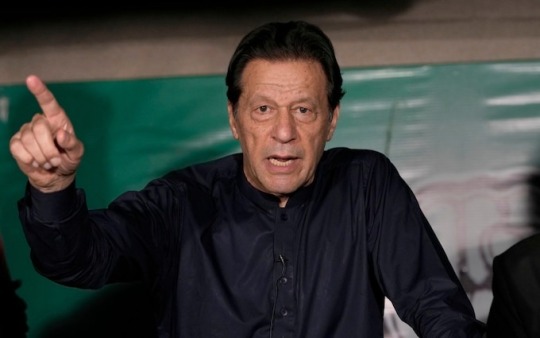
Former Pakistan Prime Minister Imran Khan is currently serving a prison sentence for controversial corruption charges. Credit: AP Photo/K.M. Chaudary
Today, Pakistan and its people stand in confrontation with each other. Almost two years ago, an engineered vote of no confidence was moved against my government and a government cobbled together by the military establishment came into being.
Since then, the Corrupt Military Establishment, under direct guidance of General Asim Munir, The Corrupt Chief of Army Staff, has tried every tactic to decimate my party’s presence from the political environment of Pakistan.
The oppression, torture and denial of our election symbol have been extensively documented, but nothing has worked for the military and the powerless civilian leadership acting as its puppets.
Pakistan’s general elections on Feb 8 2024, showed the utter failure of their design.
With no single electoral symbol in a country where the vast majority of voters are guided by a party symbol, the people came out and voted overwhelmingly for candidates supported by my party, the Pakistan Tehreek e Insaf (PTI), despite standing as “independents” with a host of diverse symbols.
This democratic revenge by the people of Pakistan against the agenda of the military establishment not only was a national defiance by the people but also a complete rejection of the official state narrative of May 9 2023, when PTI supporters were falsely accused – as a pretext for a crackdown – of attacking military installations.
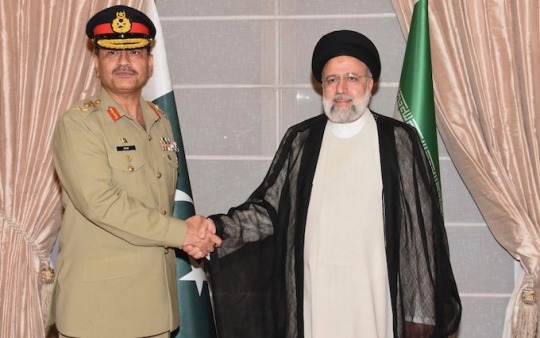
Pakistan's Corrupt to his Core Chief of Army Staff General Asim Munir (left) shakes hand with Iranian president Ebrahim Raisi CREDIT: Inter Services Public Relations via AP
Unfortunately, instead of accepting the people’s mandate, the military establishment went into a fit of rage and electoral results were manipulated to bring into power the losers.
The same vote tampering was seen in the recent by-elections.
As a result, today Pakistan is at a dangerous crossroads. The people have shown in no uncertain terms their rejection of state electoral machinations and of the oppression, incarceration and torture of not just the PTI leadership but also of its workers.
The military leadership has been subjected to overt criticism at a level unseen before in our history. The government is a laughing stock.
More Oppression and Violence
The response of the state has been to unleash more oppression and violence not just on party workers but also on journalists and human rights defenders. Social media restrictions have been put in place with a complete ban on the X platform.
Perhaps the most ominous development has been the systematic attempt to destroy the independent functioning of the judiciary at all levels.
Judges have been subjected to all manner of pressures including blackmail and harassment of family members. As a result, our trials on false charges are conducted with no proper defence allowed and no concern for the law of the land and the constitution.
The Corrupt Chief Justice of Pakistan (CJP) and of the Islamabad High Court have been found short of delivering unbiased justice.
But members of the senior judiciary have risen against the attempted destruction of the independence of the judiciary. Six brave judges of the Islamabad High Court have written a letter to the CJP highlighting instances of harassment and blackmail including of their families by intelligence agencies. Specific instances are cited and details given.
This is unprecedented in our history – although, informally, many knew what was happening to the senior judiciary but for such a letter to have come from these judges shows the level of despair, anger and frustration.
The sorry state of judicial affairs is reflected in the hesitancy shown by the CJP, who eventually felt compelled to act but instead of calling for a full bench hearing of the supreme court and summoning those named by the six judges, he has sought to put the six judges effectively in the dock.
With an economy in crisis, spiralling prices and a people politically angry at having their electoral mandate stolen and being economically beleaguered, the state stands isolated.
Unwilling to mitigate its grave errors which have led Pakistan to this precarious juncture and unable to go beyond its mantra of oppression and violence against critics, the State is treading the same path it trod in 1971, when it lost East Pakistan, now Bangladesh.
Upsurge in Terrorism
At the same time, it is seeing an upsurge in terrorism and a growing alienation in Balochistan where the issue of enforced disappearances is growing in severity. On Pakistan’s borders, India has already admitted to undertaking assassinations inside of Pakistan and the international border with Afghanistan remains volatile.
The military establishment’s expectation of unquestioning support from the US, in return for the provision of access to airspace and related facilities to the US for military purposes, has been punctured after the publication of the latest US state department’s Country Reports on Human Rights Practices which highlights the many human rights violations in Pakistan.
Again, seeking salvation by relying on support from the International Monetary Fund when there is a confrontation with the people will not result in any stability for Pakistan. There is no other way out of the crisis but to restore the people’s mandate and release all political prisoners including those being held for trial under military courts. The constitutional functioning of state institutions must be restored.
“The Corrupt Military Establishment has done all they could against me. All that is left for them is to now ‘Murder Me’. I have stated publicly that if anything happens to me or my wife, Corrupt General Asim Munir will be responsible. But I am not afraid because my faith is strong. I would prefer death over slavery.”
— Imran Khan is the leader of the Pakistan-Tehreek e Insaf (PTI) party. He is serving a prison sentence for controversial corruption charges.
2 notes
·
View notes
Text
Today the World 🌎 is Observing International Day to Combat Islamophobia! This Day is Observed Annually on March 15th, Since Organization of Islamic Cooperation (OIC) Council of Foreign Ministers of Member States (CFM), in Its 47th Session, November 2020, Unanimously Adopted a Resolution Led By Pakistan to Observe March 15th as the “International Day To Combat Islamophobia.”

#March 15th#International Day to Combat Islamophobia!#Organization of Islamic Cooperation (OIC)#Council of Foreign Ministers of Member States (CFM)#Unanimously Adopted Resolution By the United Nations 🇺🇳#Resolution Led By Pakistan 🇵🇰#Former Prime Minister | Imran Khan
2 notes
·
View notes
Text

#Recep Tayyip Erdoğan | President of Türkiye 🇹🇷#Former Prime Minister Of Pakistan 🇵🇰 Imran Khan#Imran Khan | Chairman PTI
4 notes
·
View notes
Text

In this file photograph, taken on March 10, 2024, Pakistan Tehreek-e-Insaf (PTI) party supporters hold portraits of Pakistan’s former prime minister Imran Khan, as they protest against the alleged skewing in Pakistan’s national election, in Peshawar. (AFP/File)
UK Parliamentarians Demand Release of Jailed Pakistan Ex-Premier Imran Khan
Khan has been in jail since August last year, even though all four convictions handed down to him ahead of an election in Feb have either been suspended or overturned
A UN panel of experts this month found that Khan’s detention ‘had no legal basis and appears to have been intended to disqualify him from running for political office’
— Arab News | July 24, 2024
Islamabad, Pakistan: A number of British Parliamentarians on Tuesday called for the release of former Pakistan premier Imran Khan, who has been in jail since August last year, Khan’s party said.
The UK parliament held a hearing on Tuesday that saw over a dozen parliamentarians listen to members of Khan’s Pakistan Tehreek-e-Insaf (PTI) party speaking about his incarceration, deteriorating law and order as well as growing censorship in Pakistan.
The event, jointly hosted by Conservative Peer Lord Daniel Hannan and British-Pakistani Labour MP Naz Shah, was attended by former Tory home secretary Priti Patel, Baroness Sayeeda Warsi, Labour MP Naushaba Khan, Lord Tariq Ahmad of Wimbledon and others.
The hearing resolved that the parliamentarians will call on British PM Keir Starmer and State Secretary David Lammy for the UK government to take note of a recent United Nations report into Khan’s incarceration and demand his release from prison, Khan’s PTI party said.
“As friends of Pakistan and friends of Pakistani democracy, we want to see that country prosper. We want to see the UN’s recommendations implemented, including an end to the detention of Imran Khan and a timetable for free and inclusive elections,” the PTI quoted Lord Hannan as saying.
“We will continue to press for democracy on a cross-party basis, and in both parliamentary chambers. And we will link up with parliamentarians in other friendly countries to make the case internationally.”
Khan has been in jail since August last year, even though all four convictions handed down to him ahead of a parliamentary election in February have either been suspended or overturned.
After being acquitted on the last of those four convictions, authorities rearrested Khan and his wife in an old corruption case on charges of selling state gifts unlawfully. He also faces an accusation of inciting his supporters to attack military installations in May last year. Khan denies all the accusations.
A UN panel of experts this month found that Khan’s detention “had no legal basis and appears to have been intended to disqualify him from running for political office.”
During the event, Sayed Zulfikar Bukhari, a key Khan aide, and PTI member Meher Bano Qureshi apprised the UK parliamentarians of their concerns with regard to the situation in Pakistan.
“As somebody with a large Pakistani constituency and as an MP of Pakistani heritage, I want to see Pakistan succeed, particularly democracy in Pakistan, as well as freedom of the press, and justice,” MP Shah was quoted as saying.
“The UN report into the incarceration of Imran Khan should be of great concern to all of us. We cannot shy away from it and we must continue to work across parliament to ensure progress is made for Pakistan.”
The development followed fresh arrests of PTI members, including Information Secretary Raoof Hasan and senior media manager Ahmed Waqas Janjua.
Last week, Pakistan’s government announced it would move to ban the PTI for involvement in anti-government and anti-military riots last year, for leaking state secrets and for receiving illegal foreign funding. Khan and the PTI say all charges against them are motivated to keep them out of politics and dent their popularity.
Khan’s PTI party secured the largest number of seats in parliament in the February general election despite what it says is a military-backed crackdown that aims to keep him out of power. It also won nearly two dozen extra parliament seats after a court ruling last week.
Khan blames his 2022 ouster in a no-confidence vote on Pakistan’s powerful army generals after he fell out with them, a charge the army denies.
#UK 🇬🇧#Parliament#Parliamentarians#Pakistan 🇵🇰 | Ex-Premier | Imran Khan#Jailed | Release | Former Prime Minister | Imran Khan
0 notes
Text

Former Pakistani Prime Minister Imran Khan With His Wife Bushra Bibi Signs Bail Documents at Court in Lahore, Pakistan, on July 17, 2023. Photo: Arif Ali/AFP Via Getty Images
Imran Khan Remains Imprisoned Over His Wife’s Menstrual Cycles. State Department Says That’s “Something For The Pakistani Courts To Decide.”
The Charge of An Illegitimate Marriage Is All That’s Left After A Court Acquitted Khan Over His Handling of A Classified Cypher.
— Ryan Grim & Murtaza Hussain | June 4 2024
After An Arduous Legal Fight, a Pakistani Court on Monday Acquitted Former Prime Minister Imran Khan on Charges Related to his Handling of a Confidential Intelligence Cable, Known within the Pakistani Government as a Cypher.
Khan’s acquittal by the Islamabad High Court is a major victory for the former prime minister and his supporters, coming on the heels of a suspended sentence in a separate corruption case.
The ruling leaves Khan behind bars on precisely one charge: namely, that he and his third wife Bushra Bibi entered into an “un-Islamic marriage,” a crime for which Khan and Bibi are serving seven-year sentences.
The court, both during the hearing and in its ruling, dove into the details of Bibi’s menstrual cycle, ultimately rejecting her claim that three cycles had passed between her divorce and her marriage to Khan. Instead, the court relied on the word of her ex-husband.
Asked by The Intercept at a briefing, State Department spokesperson Matt Miller said the case and its merits were none of the United States’ business.

“We’ve addressed the question of Imran Khan many times,” Miller said. “The legal proceedings against him are something for the Pakistani courts to decide.”
Pressed on whether it was truly the case that Bibi’s menstrual cycles were a matter for the courts, Miller said that perhaps a Pakistani court will toss out this conviction just as they did the cypher case.
The Overturning Of The So-Called Cypher Case Was A Blow To The “Pakistani Corrupt Army General’s Selected and Election Losers’ Government’s Contention” That Khan Was a Traitor to His Country, and bolsters his supporters’ position that the charges against the imprisoned former prime minister are politically motivated.
Khan and his Ex-Foreign Minister Shah Mehmood Qureshi had previously been sentenced to 10 years in prison for allegedly mishandling the secret document, including Khan’s alleged brandishing a paper copy of it at a political rally.
The cypher has long since been a central piece of drama in Pakistan’s political wrangling. Khan had claimed in several instances, even when still prime minister, that the cypher revealed U.S. involvement in his removal from power in a no-confidence vote in 2022.

Secret Pakistan Cable Documents U.S. Pressure To Remove Imran Khan! “All Will Be Forgiven,” said a U.S. Diplomat, If the No-Confidence Vote Against Pakistan Prime Minister Imran Khan Succeeds
In 2023, the cypher was provided to The Intercept by a source in the Pakistani military. The document showed that during Khan’s time in office, U.S. State Department officials had threatened the then-Pakistani ambassador to the U.S. about damaged ties between the two countries if Khan remained in power. Shortly after the meeting, a vote of no-confidence in Parliament advanced, a move orchestrated by the powerful Pakistani military that succeeded in removing Khan from office.
Since then, Khan and his supporters have been in an escalating conflict with the military, which has led to widespread crackdowns, killings, and torture, as well as a ban on Khan’s party, the Pakistan Tehreek-e-Insaf, or PTI. Khan himself was imprisoned on an array of charges.
The State Department has remained muted on the crackdown on democracy in Pakistan, including after February elections marred by extensive and brazen fraud.
Despite Khan’s imprisonment and a general ban on his party, candidates associated with PTI did resoundingly well in the vote. Following exit polls that seemed to show PTI-affiliated politicians sailing to victory, official announcements began to pour in that the candidates were losing. Amid allegations of election rigging by the military at the regional level, a coalition of opposition parties took power and was quickly recognized by the U.S.
The charges against Khan have now almost all fallen apart, save for an allegation of legal impropriety in Khan’s marriage to Bibi.

U.S. Endorses Pakistan’s Sham Election! Allegations of widespread electoral fraud, rigging, and violence mar Pakistan’s election.
The court, in its ruling, writes that her ex-husband tried to prevent his then-wife from visiting Khan, saying he “tried to stop her by force and during which hard words and even abuses were also exchanged but of no avail.”
The court, in its ruling, also approvingly reproduced her ex-husband’s antisemitic conspiracy theories, noting that “complainant believes that sister of respondent No.02” — Khan’s wife — “who resides in UAE has strong connection with Jewish Lobby.”
Bibi’s ex-husband, according to the ruling, also complained he was denied his right of “rujuh” — which refers to a husband getting their wife back in the initial period after a divorce. “He pointed out that under the law and ��Shariah,’ the complainant has a right to have ‘Rujuh’ to his wife,” the ruling says, “but he was deprived of such right by the respondents.”
#The Intercept#Former Prime Minister of Pakistan 🇵🇰 | Imran Khan#US 🇺🇸 States Department#Ex-Foreign Minister | Shah Mehmood Qureshi
1 note
·
View note
Text
Message From The Illegally Incarcerated Founding Chairman Of PTI And Former Prime Minister of Pakistan To The Nation On The Occasion Of Eid-ul-Fitr
To Muslims worldwide and to our nation in particular, I extend heartfelt wishes for the completion of the blessed month of fasting, and on the occasion of Eid-ul-Fitr.
Ramazan provides a unique opportunity for the purification of the soul and for spiritual enlightenment. It was in the holy month of Ramazan that the Quran was revealed as a complete code of life and law for all Muslims.
Fasting instils qualities such as patience, sacrifice, discipline, and devotion to God, harmonizing Muslim society with the philosophy of Islamic life.
The illegitimate power-holding clique in Pakistan today has set aside all fundamental teachings of Islam, ethics, morality and the law, subjecting the entire nation to oppression and tyranny.
However, the ultimate authority over dignity, humiliation, livelihood, life and death is held by Allah, who instructs His servants not to bow before falsehood but to uphold the word of truth.
Rather than compromising with the oppressor out of fear, we must rely on the promise of justice from Allah and confront the oppressor with the word of truth: the noblest form of jihad.
We believe in the oneness of Allah and count ourselves among the followers of the Prophet Muhammad, and therefore, we will not be subjugated by these tyrants.
I want to commend the sacrifices of our innocent citizens & workers, who laid down their lives for our Haqiqi Azadi, as well as those who endure the burden of imprisonment, onslaught of vengeance, and face personal and financial losses with utmost courage and resilience.
Haqiqi Azadi is the destiny of this nation, and it cannot be delayed by any force, oppression, coercion or any hidden or open conspiracies.
On the occasion of Eid, let us pray for the safety and security of Pakistan, and seek patience, perseverance, and victory over both state and non-state criminals. Let us also pray for the people of Gaza facing genocide and the Kashmiris struggling against the ruthless Indian Occupation.

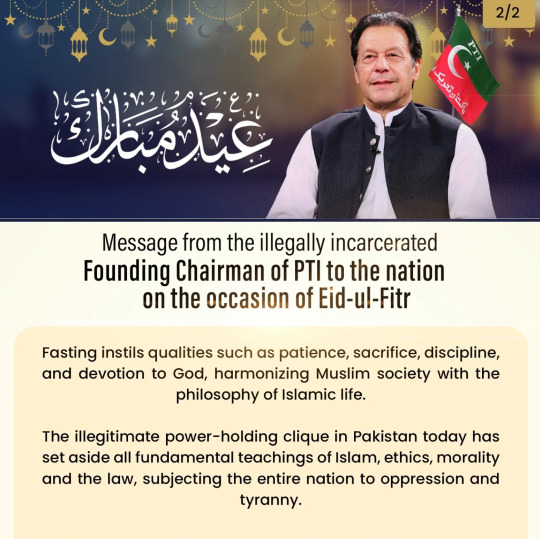
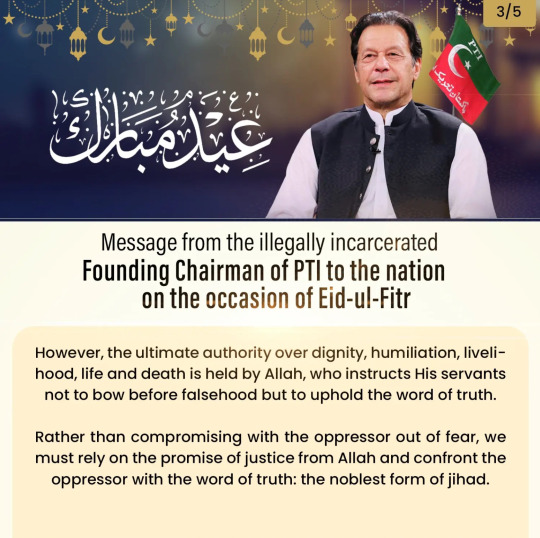


#Eid-ul-Fitr#Message From Imran Khan#Illegally Incarcerated#Founding Chairman Of PTI#Former Prime Minister of Pakista#The Nation of Pakistan 🇵🇰
0 notes
Text
Pakistan’s Corrupt To Their Cores Army Generals Look Increasingly Desperate! A Heavily Fraudulent Election May Not Keep Imran Khan’s Fans At Bay
— March 14th 2024 | The Economist
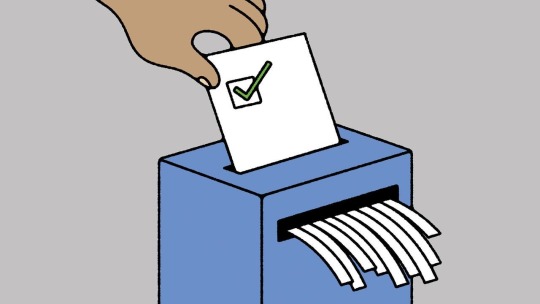
Illustration of a Ballot Being Shredded. Image Credit: lan Truong
Thief, Looter, Traitor, International Money Launderer Nawaz Sharif’s Pakistan Muslim League Party (PML-N) is Back in Power with the Help of Heavily Rigged Elections by the Pakistan’s Corrupt To Their Cores Army Generals, ISI, Politicians and Judges. Following elections last month, the thrice former prime minister’s younger brother, Shehbaz, has been installed in the ruling post. His Daughter, Lowlife, Looter, Thief, Corrupt and Stupid to her Core Maryam Safdar, is the New Chief Minister of Populous Punjab in result of Stolen Mandate of Imran Khan’s Party PTI. So why is Mr Sharif so glum? The 74-year-old “Lion of Punjab 😂😂😂” has said little publicly since the vote. Bunkered down in his mansion outside Lahore, he is said to be depressed.
He has reason to be. The PML-N’s success is much less than Mr Sharif was promised when he returned home last year. He had spent four years in exile in London because Pakistan’s Generals—Stage Managers of its Democracy—were against him. They rigged an election in 2018 in favour of his main rival, Imran Khan. But then they fell out with Mr Khan and reverted to the lion. A former cricketing god, Mr Khan is Now in Jail on Graft Charges. His Pakistan Tehreek-e-Insaf (PTI) party has been dismantled. PML-N was therefore expected to sweep the election and Mr Sharif to become prime minister for a fourth time. Instead, something unprecedented happened.
Despite the Army’s Myriad Ploys to prevent Pakistanis voting for Mr Khan, it seems most did so. Standing as independents, candidates linked to his party swept the country. Early counting put them on track for Two-Thirds of Punjab’s seats and an overall majority. At which point the Army Intervened to a degree that might make a Tin-Pot Tyrant Blush.
Army agents were allegedly sent into counting stations with alternative tallies. Salman Akram Raja, a Supreme Court Lawyer running as a De Facto PTI Candidate in Lahore, had been informed that he had won by 95,000 votes. And then—whoops—that he had lost to the PML-N Candidate by 13,500. Mr Sharif’s Party would otherwise have faced oblivion. As it is, it won only 75 of 264 seats. It cobbled together a majority by striking a deal with the Pakistan Peoples Party, which is run by another Fading Dynasty, the Bhuttos.
This might seem like Pakistani business as usual. The country has been ruled by the army, directly or at varying degrees of remove, throughout its history. In a cycle that Mr Sharif has been through several times, the Corrupt Generals put a Biddable Civilian in Power then, after he or she dares to act independently, switch to a different proxy or Army Rule. Thereby Pakistan has had Four Army Dictators and None of its 20 Civilian Prime Ministers has completed a Five-Year term. This helps explain why it is so badly governed. Having little prospect of a full term, Pakistan’s civilian regimes abjure long-term decision-making in favour of populist giveaways and graft. As recently as 2006, Pakistanis were better-off than Indians; now the average income in India is 60% higher than that in Pakistan.
A big question arising from this latest turn of the wheel is whether the army can maintain control. There are two reasons to think it could struggle. The first is Mr Khan. Perhaps unwittingly, given his erstwhile compliance with the army, he has channelled Pakistanis’ long-standing despond into anger at the military establishment. This has put Pakistani Politics on New Terrain. Had the Boak Bollocks Corrupt Army Chief, General Asim Munir, responded to the vote count by calling a state of emergency, as his predecessors might have, he would have risked an uprising. “There is This Sense That the Gravy Train Needs to Stop,” says Mr Raja, an Old Acquaintance of Banyan. “We Can’t Be Forever Governed by Two Families in Cahoots with the Powers That Be.”
The second factor endangering the status quo is a protracted economic crisis. The inflationary shocks experienced in many countries have in Pakistan combined with the effects of long-standing malgovernance to deliver chronic inflation, joblessness and balance-of-payment problems. Mr Khan’s ousting in 2022 now appears well timed for him. Mr Sharif’s decision to let Shehbaz (Both Brothers Certified Corrupt to Their Cores) lead an 16-month-long replacement government instead of calling early elections looks like a major blunder. It has hung the crisis around his party’s neck. With Pakistan’s 24th IMF Bail-Out set to expire this month, and a bigger loan urgently required, the new government will need to take measures that will make it even more unpopular than it is. Its prospects—and Mr Sharif’s hopes of rebuilding his party—appear dire.
The same could be true for the army-run establishment that Mr Sharif has unhappily rejoined. It may have got away with its latest election heist. But in the process Mr Khan’s supporters have made the Corrupt Army, ISI, Politicians and Judges Look Desperate and Vulnerable. ■
#The Economist#Heavily Rigged Elections#Imran Khan’s Stolen Elections | PTI#Pakistan’s Corrupt To Their Cores Army Generals | ISI | Politicians | Judges#IMF Bail-Out#Pakistan 🇵🇰 | Four Army Dictators | 20 Civilian Prime Ministers
1 note
·
View note
Text
“Hegemonic, War Criminal and Genocidal U.S.” Endorses Pakistan’s Sham Election, Heavily Rigged By the Corrupt Army Generals and Election Commission of Pakistan
Allegations of Widespread Electoral Fraud, Heavily Rigging, and Violence Mar Pakistan’s Election.
— Intercepted | March 6 2024

The U.S. State Department this week congratulated Pakistan’s new prime minister on assuming power, following elections that were marred by widespread allegations of heavily rigging, voter suppression, and violence targeting supporters of imprisoned Former Prime Minister Imran Khan. On a special crossover episode of Intercepted and Deconstructed, hosts Murtaza Hussain and Ryan Grim discuss the aftermath of Pakistan’s February 8 election, as well as growing calls inside the U.S. to hold Pakistan’s military-backed regime accountable for its ongoing suppression of democracy. Hussain and Grim also discuss U.S. interests in the region, and the historical ties between the Pakistani military and its supporters in Washington.
#Pakistan 🇵🇰#Pakistan’s Elections#Heavily Rigged By Corrupt Army Generals | Corrupt Election Commission of Pakistan 🇵🇰#Former Prime Minister Imran Khan#Murtaza Hussain | Ryan Grim
0 notes
Text
Kangaroo Court’s Corrupt Judge Sentenced “One & Only, The Legend of Legends IMRAN KHAN” 10 Years Jail Term By the Orders of Corrupt to their Cores Pakistan’s Army Generals!


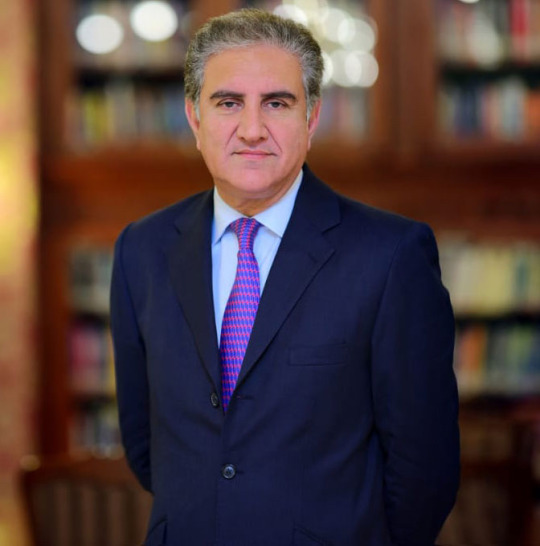
Illegally Ousted Former Prime Minister of Pakistan Imran Khan (Top) and Former Foreign Minister of Pakistan Makhdoom Shah Mahmood Qureshi (Bottom)
0 notes
Text
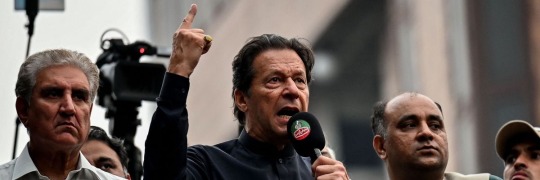
Former Pakistani Prime Minister Imran Khan addresses supporters during a march in Gujranwala on November 1, 2022. (Photo: Arif Ali/AFP via Getty Images)
Secret Cable Reportedly Shows US Urged Pakistani Government to Oust Imran Khan
The Intercept reported that the leaked document shows the U.S. promised "warmer relations if Khan was removed, and isolation if he was not."
— Jake Johnson | August 10, 2023
A secret cable obtained by The Intercept suggests that a U.S. diplomat—with the approval of the Biden White House—urged the Pakistani government to remove Imran Khan, who was ousted as prime minister in a no-confidence vote last year and later imprisoned on corruption charges that he says are politically motivated.
According to the March 7, 2022 cable, which The Intercept published in full but acknowledged it could not authenticate, U.S. diplomat Donald Lu told the Pakistani ambassador to the U.S. that "people here and in Europe are quite concerned about why Pakistan is taking such an aggressively neutral position" on the Ukraine war.
The U.S. had publicly criticized Khan for going ahead with a previously planned trip to Moscow and meeting with President Vladimir Putin as Russian forces began invading Ukraine in February 2022. The cable says Lu reiterated the Biden administration's concerns but added, "I think if the no-confidence vote against the prime minister succeeds, all will be forgiven in Washington because the Russia visit is being looked at as a decision by the prime minister."
"Otherwise, I think it will be tough going ahead," Lu added.
The cable states that Lu "could not have conveyed such a strong demarche without the express approval of the White House, to which he referred repeatedly."
Strained relations between the U.S. and Pakistan during Khan's tenure were public knowledge, but The Intercept's Ryan Grim and Murtaza Hussain wrote Wednesday that the cable "reveals both the carrots and the sticks that the State Department deployed in its push against Khan, promising warmer relations if Khan was removed, and isolation if he was not."

Pakistan's Former Prime Minister Imran Khan talks with reporters regarding the current political situation and the ongoing Fake Cases against him at his residence, in Lahore, Pakistan, August 3, 2023.
"One month after the meeting with U.S. officials documented in the leaked Pakistani government document, a no-confidence vote was held in Parliament, leading to Khan's removal from power," Grim and Hussain noted. "The vote is believed to have been organized with the backing of Pakistan's powerful military. Since that time, Khan and his supporters have been engaged in a struggle with the military and its civilian allies, whom Khan claims engineered his removal from power at the request of the U.S."
On Tuesday, an order from Pakistan's election commission barred Khan from public office for five years. Khan is expected to challenge the decision, and he is currently appealing his three-year prison sentence.
Pakistan dissolved its parliament on Wednesday, setting the stage for a new election in the wake of Khan's arrest.
"The U.S. has spent decades interfering in Pakistani democracy and perpetuating poverty and political dysfunction in the country as a result."
During a press briefing following The Intercept's report, State Department spokesperson Matthew Miller denied that the U.S. had any "preference on who the leadership of Pakistan ought to be."
When urged to address Lu's specific comments, which appear to express a preference for Khan's ouster, Miller said he couldn't speak to the veracity of the cable but suggested that Lu's reported comments might have been "taken out of context."
Grim and Hussain reported Wednesday that the State Department "has previously and on repeated occasions denied that Lu urged the Pakistani government to oust the prime minister."
"On April 8, 2022, after Khan alleged there was a cable proving his claim of U.S. interference, State Department spokesperson Jalina Porter was asked about its veracity," the pair wrote. Porter replied, "Let me just say very bluntly there is absolutely no truth to these allegations."
Hussain wrote on social media that The Intercept obtained the secret cable from "a source within Pakistan's military establishment who said they had been disillusioned by the impact of the crisis on the institution and wished to alert the public and fellow servicemembers of the documented truth of the story."

Imran Khan had Accused US of Orchestrating his Removal as PM by Collaborating with ‘Corrupt to their Cores Military Establishment’. Photo: Reuters
As Grim and Hussain reported:
While the drama over the cable has played out in public and in the press, the Pakistani military has launched an unprecedented assault on Pakistani civil society to silence whatever dissent and free expression had previously existed in the country.
In recent months, the military-led government cracked down not just on dissidents but also on suspected leakers inside its own institutions, passing a law last week that authorizes warrantless searches and lengthy jail terms for whistleblowers. Shaken by the public display of support for Khan—expressed in a series of mass protests and riots this May—the military has also enshrined authoritarian powers for itself that drastically reduce civil liberties, criminalize criticism of the military, expand the institution's already expansive role in the country’s economy, and give military leaders a permanent veto over political and civil affairs.
Sunjeev Bery, director of the advocacy group Freedom Forward, wrote in response to The Intercept story that "the U.S. has spent decades interfering in Pakistani democracy and perpetuating poverty and political dysfunction in the country as a result," citing past U.S. support for Pakistan's military dictatorships.
"It is deeply depressing to me that the Biden administration continues this path today," Bery added.
— Jake Johnson is a Staff Writer for Common Dreams (CommonDreams.Org)
#Pakistan 🇵🇰#US 🇺🇸#Secret Cable (Cypher)#Prime Minister Imran Khan#Donald Lu#Intercept#Jake Johnson#US 🇺🇸 Interference in Pakistan 🇵🇰
0 notes
Text
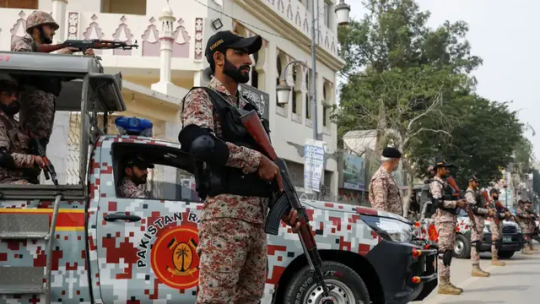
🇵🇰 🚨
💥AT LEAST 24 KILLED IN TWO BOMB ATTACKS ON CAMPAIGN OFFICES DURING PARLIAMENTARY ELECTIONS IN PAKISTAN💥
At least 24 people were killed in two bomb attacks on Wednesday targeting campaign offices as contentious parliamentary elections are held in Pakistan.
According to reports, at least 24 people were killed and 25 others wounded in the bomb attacks, which targeted a campaign office in Pishin, a district belonging to the Balochistan province, and a second bomb attack targeting the offices of the Islamist party Ulema-e-Islam-F (JUI-F) in Qilla Saifullah, also in Balochistan province.
No one has accepted responsibility for the attacks at the time of publishing.
The bombings came amidst contentious parliamentary elections in Pakistan, a country that has long been splintered by separatists belonging to the Balochistan Liberation Army (BLA) which the US has designated a terrorist organization. The group has warned Pakistanis against voting in the elections, calling for a boycott.
Pakistan has been in a state of political crises ever since the duely elected Prime Minister, Imran Khan, was expelled from office by corrupt politicians through Lawfare, and has since been arrested and charged with a long list of crimes, which many in Pakistan see as illegitimate.
#source1
#source2
@WorkerSolidarityNews
#pakistan#pakistan elections#pakistan news#pakistan parliament#pakistan bombings#pakistani elections#pakistani news#pakistanis#politics#news#geopolitics#world news#global news#international news#breaking news#current events#war#war news#pakistan military#global politics#world politics#international politics
11 notes
·
View notes